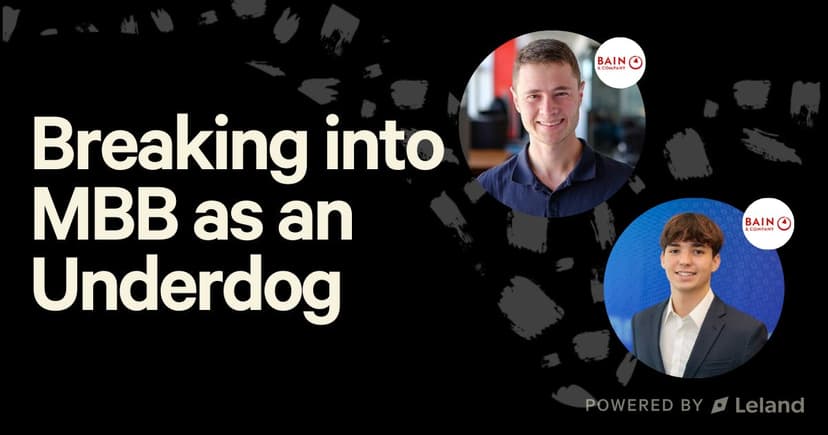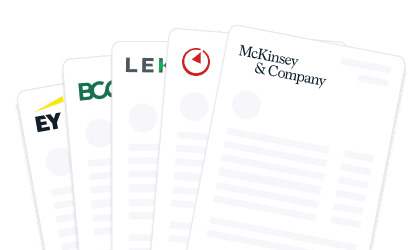How to Prepare for Accenture Management Consulting Case Interviews?
Learn how to ace your Accenture management consulting case interviews with our comprehensive guide.
Posted June 13, 2025

Join a free event
Learn from top coaches and industry experts in live, interactive sessions you can join for free.
Table of Contents
If you’re looking to land a job as a management consultant at Accenture, one of the most important parts of the interview process is the case interview. These are designed to test your analytical, problem-solving, and communication skills and will give your interviewer an idea of how you approach complex problems. In this guide, we’ll cover everything you need to know to prepare for an Accenture management consulting case interview.
Overview of Accenture Management Consulting Case Interviews
The Accenture management consulting case interview will consist of a hypothetical problem or scenario that you’ll need to solve in a limited amount of time. The interviewer will present you with a specific business challenge and ask you to explain the steps you would take to address the issue. Your goal is to demonstrate your ability to think critically and apply your knowledge of business principles to real-world situations.
It is important to note that the Accenture management consulting case interview is not just about finding the right answer, but also about showcasing your problem-solving process and communication skills. The interviewer will be evaluating your ability to structure your thoughts, ask relevant questions, and present your ideas in a clear and concise manner. Therefore, it is recommended to practice with sample case studies and to prepare for potential follow-up questions that may arise during the interview.
Understanding the Interview Process
Before you start, it’s important to understand the timeline of the interview process and what to expect on the day of the interview. You’ll typically meet with multiple interviewers, each of whom will assess a different aspect of your skills and knowledge. There may be several rounds of interviews, including phone screenings, in-person interviews, and panel interviews.
It’s also important to research the company and the position you’re interviewing for. This will help you understand the company culture, values, and goals, and allow you to tailor your responses to the interviewer’s questions. Additionally, you should prepare questions to ask the interviewer about the company and the position, as this shows your interest and engagement in the opportunity.
During the interview, it’s important to make a good first impression by dressing professionally, arriving on time, and being polite and respectful to everyone you meet. You should also be prepared to discuss your qualifications and experience in detail, and provide specific examples of how you’ve demonstrated your skills in previous roles. Finally, don’t forget to follow up with a thank-you note or email after the interview to express your appreciation for the opportunity and reiterate your interest in the position.
Types of Case Interviews and How to Approach Them
There are several types of case interviews that you might encounter during the interview process. These include strategy cases, profitability cases, market entry cases, and others. It’s important to understand the differences between each type and to prepare accordingly. One way to prepare is by practicing with sample case interviews, which you can find online or through case interview preparation services.
Strategy cases typically involve analyzing a company’s overall business strategy and making recommendations for improvement. These cases often require a deep understanding of the industry and market trends. Profitability cases, on the other hand, focus on identifying ways to increase a company’s profits. This may involve analyzing cost structures, pricing strategies, and revenue streams.
Market entry cases are common for companies looking to expand into new markets. These cases require an understanding of the target market, competition, and potential barriers to entry. Other types of cases may include mergers and acquisitions, operational efficiency, and product development.
Regardless of the type of case, it’s important to approach each one with a structured and analytical mindset. This involves breaking down the problem into smaller components, gathering relevant data, and developing a clear and concise recommendation. It’s also important to communicate effectively with the interviewer, asking clarifying questions and presenting your findings in a logical and organized manner.
By understanding the different types of case interviews and how to approach them, you can increase your chances of success in the interview process and demonstrate your ability to think critically and strategically.
Preparing for the Interview: Tips and Strategies
Now that you know what to expect, it’s time to start preparing. Here are some tips and strategies to help you get ready for your Accenture management consulting case interview:
- Brush up on your accounting, statistics, and financial analysis skills
- Practice your mental math skills
- Read case study books and articles to get an idea of how to approach case interviews
- Research Accenture and the consulting industry as a whole to understand the company’s culture and values
- Practice active listening and communication skills
- Develop a framework for approaching case interviews to help you stay organized
- Know how to answer "Why Accenture?"
Additionally, it’s important to dress appropriately for the interview. Accenture is a professional consulting firm, so you should dress in business attire. This means wearing a suit or dress pants and a blazer, and avoiding anything too flashy or casual. Remember, first impressions are important, and dressing professionally can help you make a good one.
Developing Your Analytical and Problem-Solving Skills
The key to acing the Accenture management consulting case interview is being able to think critically and analyze complex data. Here are some strategies for developing your analytical and problem-solving skills:
- Practice breaking down complex problems into smaller, more manageable parts
- Learn how to prioritize and allocate resources effectively
- Practice brainstorming and generating creative solutions to problems
- Practice structuring your thoughts and ideas to make them easier to communicate
Another strategy for developing your analytical and problem-solving skills is to seek out opportunities to work on real-world problems. This could involve volunteering for a non-profit organization, participating in case competitions, or taking on challenging projects at work or in school.
Additionally, it can be helpful to seek out feedback from others on your problem-solving approach. This could involve working with a mentor or coach, or simply asking for feedback from colleagues or classmates. By incorporating feedback into your approach, you can continue to refine your skills and become a more effective problem solver.
Practicing with Mock Case Interviews
One of the best ways to prepare for your Accenture management consulting case interview is by practicing with mock case interviews. You can find sample cases online or through case interview preparation services. The more practice you get, the more comfortable and confident you’ll be on the day of the interview.
Mock case interviews can also help you identify areas where you need to improve. By practicing with different cases, you can identify patterns in your thinking and approach, and work on addressing any weaknesses. Additionally, practicing with others can help you learn from their approaches and strategies, and incorporate them into your own.
It’s important to remember that mock case interviews are not just about getting the right answer. They are also about demonstrating your problem-solving skills, communication abilities, and ability to work under pressure. Make sure to practice articulating your thought process clearly and concisely, and to stay calm and focused throughout the interview.
Handling Behavioral Questions During the Interview
In addition to the case interview, you may also encounter behavioral or situational questions during the interview process. These are designed to assess your personal qualities, such as teamwork, leadership, and communication skills. Be prepared to answer questions that ask you to describe a time when you demonstrated these qualities in the past.
When answering behavioral questions, it's important to provide specific examples and details. Use the STAR method to structure your answers: describe the Situation, Task, Action, and Result. This will help you provide a clear and concise response that showcases your skills and experience.
It's also important to be honest and authentic in your responses. Don't try to give the answer you think the interviewer wants to hear. Instead, focus on providing a genuine example that demonstrates your strengths and abilities. This will help you build a strong rapport with the interviewer and increase your chances of landing the job.
Common Mistakes to Avoid During the Interview
There are a few common mistakes that candidates make during the Accenture management consulting case interview. Be sure to avoid these by:
- Avoiding jumping to conclusions before you fully understand the problem
- Not making assumptions without first confirming them with the interviewer
- Not being afraid to ask for clarification if you don’t fully understand the question
- Communicating your thought process clearly and concisely
- Avoiding giving generic or surface-level answers
Another common mistake to avoid during the Accenture management consulting case interview is not taking the time to organize your thoughts before answering the question. It's important to take a few moments to gather your ideas and structure your response in a logical and coherent manner.
Additionally, it's important to remember that the interviewer is not just evaluating your problem-solving skills, but also your ability to work well with others. Avoid being overly aggressive or dismissive of the interviewer's input, and instead, demonstrate your ability to collaborate and consider different perspectives.
Final Tips and Advice for Acing Your Accenture Management Consulting Case Interview
Here are a few final tips and pieces of advice to help you succeed:
- Stay calm and composed throughout the interview
- Be respectful and engaging with your interviewer
- Remember that the interview is a two-way street – both you and the interviewer should be assessing whether or not you’re a good fit for the company
- Be confident in your abilities and in your approach to problem-solving
- Don’t be afraid to ask questions or to seek feedback after the interview
By preparing effectively and following these tips, you’ll be well on your way to acing your Accenture management consulting case interview. Remember to stay focused, stay calm, and be confident in your abilities, and you’ll be sure to impress your interviewer.
Additionally, it’s important to research the company and the industry beforehand. This will not only show your interest and dedication to the job, but it will also help you understand the types of problems and challenges the company may face. This knowledge can be invaluable during the case interview, as it can help you come up with more relevant and insightful solutions.
For expert tips on how to prepare for interviews at other top-tier consulting firms, check out these resources:
Browse hundreds of expert coaches
Leland coaches have helped thousands of people achieve their goals. A dedicated mentor can make all the difference.


























